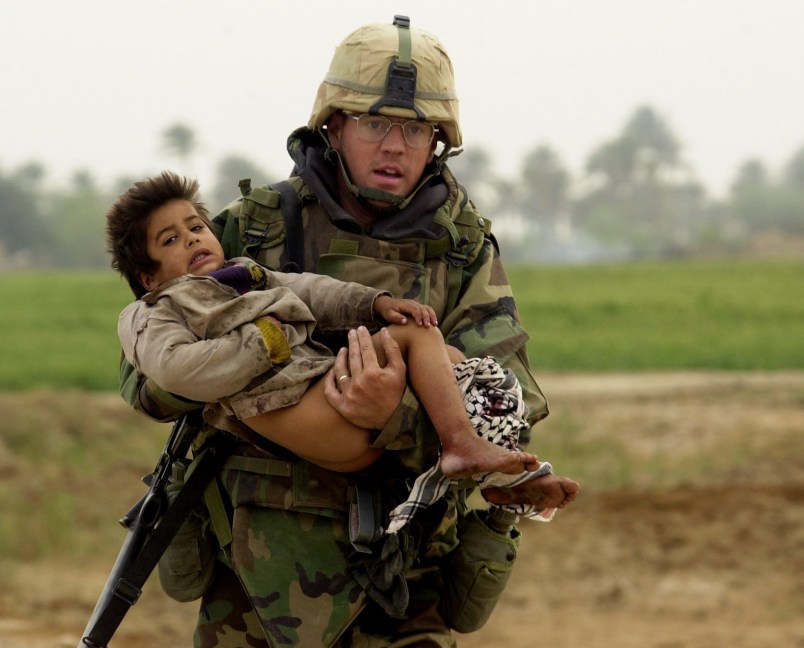Eleven years ago today, the U.S. began a military action in Iraq – one that cost thousands of lives, American and Iraqi, and left us mired in a decade-long occupation.
There were a lot of reasons given, in those weeks leading up to the invasion, for why we had to send troops and treasure into Iraq. Over time, those reasons eroded away, as the intelligence behind the case for war proved false and we weren’t greeted with rose petals. That leaves behind the saddest and most accurate explanation for why we actually did: because we had to be “tough.”
The theory went like this: the 9/11 attacks showed that the world didn’t fear and respect America anymore. Therefore, America had to prevent future crises by destroying an enemy in the sight of the world.
The “best” explanation of this worldview can be seen in Jonah Goldberg’s 2002 National Review articles making the case for invasion, citing the foreign-policy analyst Michael Ledeen:
… here is the bedrock tenet of the Ledeen Doctrine in more or less his own words: “Every ten years or so, the United States needs to pick up some small crappy little country and throw it against the wall, just to show the world we mean business” … The United States needs to go to war with Iraq because it needs to go to war with someone in the region and Iraq makes the most sense.
But the organs of the conservative right weren’t the only ones advancing the “tough” argument. In explaining why the war was “worth it,” Tom Friedman told Charlie Rose that “what we needed to do was to go over to that part of the world and burst that bubble…you think this bubble fantasy, we’re just going to let it grow? Well, suck on this. That’s what the war was about … we hit Iraq because we could.”
Bush himself frequently talked about the war as a way to “show resolve.” His Vice-President, Dick Cheney, talked about how the war would represent a “strong, firm U.S. response to terror.”
The Iraq War was going to be a counterweight to terrorism and dictatorship because it was going to prove how tough and relentless we were.
They really, really believed this.
They were wrong.
Nothing in the past few decades has eroded America’s credibility, its standing in the world, its capacity to go to war, like the war in Iraq. We expended billions upon billions of dollars and thousands of human lives in pursuit of showing off how tough we were, and the result was a disaster.
Conservative politicians and pundits love “tough.” They seem to have learned nothing from he war in Iraq, and use the same logic to demand belligerent responses to every world event. They’re fond of criticizing President Obama for not adopting a tough enough pose.
Nowhere is this clearer than in the current crisis in Ukraine. Across the spectrum of the Republican Party, Vladimir Putin’s attempt to seize control of the Crimea has been an opportunity to take predictable swings at Obama for apparent want of “toughness.” It’s really, really easy to sit on the sidelines and make noise about increasing the volume of your belligerence, but Obama is actually taking the steps that his domestic opponents are demanding.
These “tough”-obsessed American political figures look at Putin with something more like envy than disdain. Putin makes “tough” into a constant performance: he ride horses shirtless, shoots tigers and sharks, glowers and threatens. That a leader with a propaganda apparatus at his disposal would play-act toughness and broadcast it is unsurprising; what’s sad and strange is how eagerly American conservatives buy what they’re being sold. (For a perfect distillation, check out Jon Stewart’s roundup of conservatives glorying in Putin’s toughness.)
Anyone can play-act “tough.” In May 2003, President Bush announced the end of “major combat operations” on an aircraft carrier, after performing a completely gratuitous fighter-jet landing that the pro-invasion pundits oohed and aahed at. Landing a jet and striding around in a flight suit is a nice bit of play-acting, but it didn’t prevent the war from dragging on for years, boosting the relative power of Iraq’s neighbor Iran and cycling American soldiers through grueling deployments and re-deployments.
The pro-invasion pundits loved Bush’s swagger and his saber-rattling, and they loved it even as it weakened the country it was supposed to be boosting.
“Tough” is nice in pictures, but it’s not a substitute for foreign policy. When the same people who promoted the Iraq war whine that we’re not being “tough” enough towards Iran, or Putin, or terror groups in North Africa, we should keep in mind just how badly bruised we got last time they convinced us that “showing resolve” was the silver-bullet solution to any global problem.
When Sens. John McCain (R-AZ) and Lindsey Graham (R-SC) spout off about how whatever latest crisis wouldn’t have happened if we’d acted tougher, remember that the worst damage we did to ourselves was when we took their advice.
Seth D. Michaels is a freelance writer in Washington, D.C. He’s on Twitter as@sethdmichaels.






